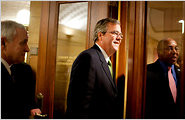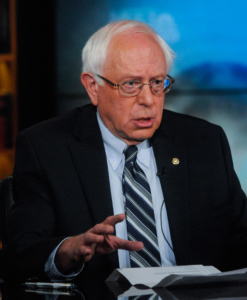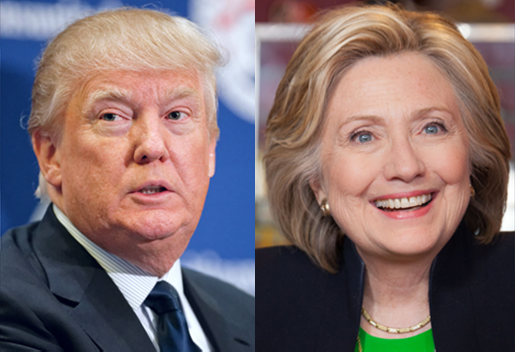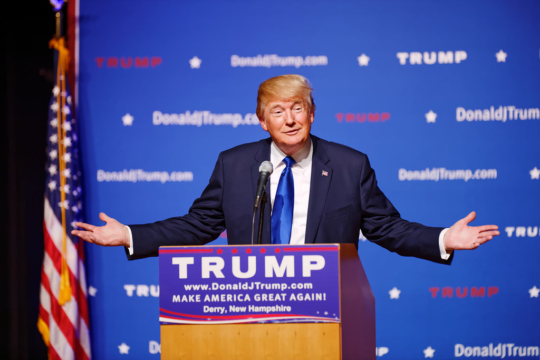
Jeb Bush and National Education Reform
Washington Post article on Jeb Bush, his agenda for education reform, and the three principles guiding that change.
For those who believed that Hillary Clinton would cruise to be the Democratic nominee for president of the United States, and that Jeb Bush – although facing a far rockier path in a crowded field of candidates – would do the same in the Republican Party, this summer was full of surprises. Commentators may not have been too excited by this match-up, but the widely held assumption was that name recognition, money, organization and discipline would carry the day.
To be sure, it’s very early in the campaign and many political analysts still say the odds are that Hillary and (albeit less likely) Jeb will face each other in November 2016 to be the 45th president of the United States. But both parties’ races are now uncertain, thrown in disarray by widespread disenchantment and resentment against all mainstream politicians regardless of stripe, resulting in fertile ground for protest candidates and outsiders. For a frustrated electorate, the prospect of yet another Clinton/Bush contest wasn’t arousing much enthusiasm.
The biggest shock so far has of course been the emergence, dramatic ascent and, perhaps most surprising, staying power, of Donald Trump in the Republican field. The real estate magnate has soared in the polls, leading his rivals both nationally and in key states. Trump has shrewdly tapped into an angry national mood, anxious about profound demographic changes in the country and what is perceived as the US’s declining position in the world. In making his case, Trump shows disdain for facts – as journalist after journalist has discovered, trying to engage in a rational exchange with him is futile – but exudes passion and speaks impulsively, which has appeal in an otherwise controlled, calculating political culture. In that respect, he is the anti-Obama.
Trump has shrewdly tapped into an angry national mood, anxious about profound demographic changes in the country and what is perceived as the US’s declining position in the world.
Among Trump’s most ill-informed and odious remarks to date is his characterization of Mexicans living in the United States. His proposals to build a wall along the border and deport an estimated 11 million unauthorized migrants are both offensive and impractical. Pressed by Univision’s Jorge Ramos in a heated exchange on these issues, Trump refused to budge from his outrageous claims. Needless to say, nativist populist rhetoric – especially at moments of deep-seated change – has often played well with at least some segment of the US electorate, but insulting an increasingly powerful political constituency like Latinos will complicate the Republican Party’s path to return to the White House.
Historians and commentators, trying to define the Trump phenomenon and put it into some perspective, have invoked US analogues, from billionaire Ross Perot, who got 19 percent of the vote in the 1992 election, to segregationist George Wallace, who ran in 1968. Others have compared Trump to Putin and Berlusconi. But after watching the rousing Trump rallies in Mobile, Alabama and Dubuque, Iowa (who said a brash New Yorker would not play well in the South and Midwest?), it is hard to resist the stylistic parallels with the late Venezuelan strongman Hugo Chavez. Trump’s stream of consciousness discourse, his instinct for the hot-button issues and flair for showmanship, megalomania, and taunting and teasing of political rivals (in the US, it is hard to think of anything comparable in recent years) evokes Chavez’s often rambling speeches that were effective in mobilizing his base against “squalid” elites who, he charged, were responsible for Venezuela’s woes.

The Trump juggernaut has been disconcerting for his rivals for the Republican nomination. Bush seems to have particularly thrown off balance and has made a number of missteps that he later corrected. The other contenders, too, have been unsettled by Trump – who is his own peculiar brand, with eclectic positions, not really a Republican or a conservative in any meaningful sense. So far Trump’s continuing surge has defied all predictions. The question is whether he can convince enough Republicans that he can win the White House and whether those supporters, now taken with his message, really want him to be making crucial decisions that affect the national well-being. The betting is that in the end, someone else in the field will earn the top spot – plausible contenders include Jeb, but also Florida Senator Marco Rubio or Ohio governor John Kasich – but as long as Trump is speaking his mind the path to the nomination will be filled with landmines.
On the Democratic side, too, there is great flux and uncertainty. In the current field, Hillary remains the favorite to be the nominee, strongly backed by the Democratic establishment and having mounted an effective campaign machine. But Clinton has had a very difficult summer, with serious questions about the use of a personal email server for official business and sending of possibly classified emails during her tenure as Secretary of State. An FBI investigation is underway, which is never helpful for inspiring confidence, even if she is not charged with any crime. Indeed, recent survey results are quite worrisome for Hillary: over 60 percent of the electorate does not find her trustworthy or honest.
Clinton’s largely successful effort to reinvent herself following the scandals that bedeviled her and her husband for years risks being undone. As senator from New York she was widely respected and, apart from controversies about her handling of the attack in Bengazhi, Libya (where four Americans were killed), she generally won high marks as Secretary of State for smart and effective diplomacy. But news about personal enrichment from exorbitant speaking fees since leaving the Obama administration, questions about conflict of interest with foreign governments’ support of the Clinton Foundation, and her clumsy and unconvincing defense of her use of her own server have recalled the kind of devious and slippery image she was so determined to shed. These self-inflicted errors have taken a huge toll.
Posing a more significant challenge to Clinton’s candidacy than anyone expected and capitalizing on the country’s anti-establishment mood has been the socialist senator from Vermont Bernie Sanders. Sanders’ forceful indictments of the country’s economic and political elites have resonated with voters, producing large and enthusiastic crowds and rising poll numbers. Sanders now leads Clinton by three points in New Hampshire, where the first primary will be held, and most surprisingly, according to one poll, he has come within seven points of Hillary in Iowa, where the key caucuses take place in early February and where, until now, she enjoyed a commanding lead.
Hillary’s vulnerability and her drop in the polls have given rise to speculation about other candidates entering the race. Though Sanders has doubtless struck a chord and generated some excitement, it is hard to imagine him as the Democratic nominee. From all accounts, vice president Joe Biden, widely respected as a seasoned politician and for his decency and authenticity, is seriously contemplating announcing his candidacy, as he did twice before, in 1988 and 2008. Whether Biden will ultimately jump in is hard to know, but the fact that he is consulting widely and mulling it over is a measure of how concerned Democrats are about Hillary. At the very least, Biden could serve as an insurance policy, should Clinton’s candidacy collapse.
Whoever eventually emerges as the Republican and Democratic nominees will have to confront the electorate’s growing discontent with politics as usual and resentment of the power of economic elites.
As Obama approaches the end of his presidency, and however one assesses his legacy, one thing is clear: whoever eventually emerges as the Republican and Democratic nominees will have to confront the electorate’s growing discontent with politics as usual and resentment of the power of economic elites. Although the entertainment aspect of the campaign and focus on personalities won’t disappear in the coming months, it is likely that some serious issues and events – from the global economy and Iran nuclear deal to violence in US cities – will become more important. And the impact of Pope Francis’s anticipated address to a joint session of the US Congress on September 24th should not be underestimated.
Michael Shifter is president of the Inter-American Dialogue and an adjunct professor at Georgetown University’s School of Foreign Service.
Washington Post article on Jeb Bush, his agenda for education reform, and the three principles guiding that change.
Some of the top energy-related issues in the 2016 US presidential elections have important implications for LAC.
For anyone still wondering how Donald Trump came to be the Republican Party’s nominee for president of the United States, his surprise visit to Mexico on Wednesday for a meeting with President Enrique Peña Nieto offered some clues.

